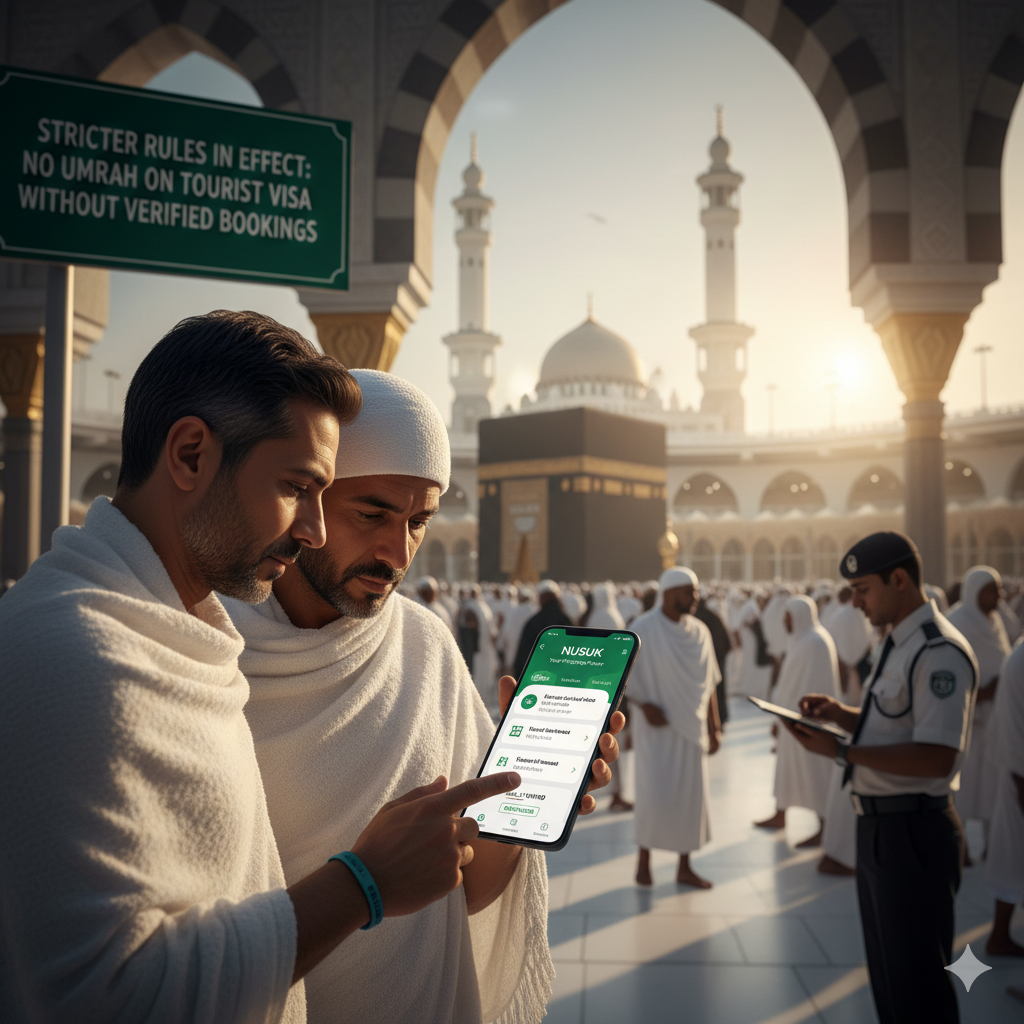
The sacred journey of Umrah pilgrimage to Makkah and Madinah has undergone a significant regulatory transformation. Saudi Arabia, in a move to enhance pilgrim safety, combat fraud, and streamline logistics, has implemented stricter rules for the Umrah pilgrimage. The days of using a standard tourist visa as a primary means for performing Umrah are effectively over. A core part of Saudi Vision 2030, these changes mandate comprehensive pre-booking and digital verification for all Umrah pilgrims. Understanding these 10 key changes is crucial for anyone planning their spiritual pilgrimage.
1. Mandatory Pre-Booked Accommodation and Transport: The Cornerstones of the New Umrah System
The single most pivotal of the stricter rules is the mandate for pre-booked and verified services. No longer can a pilgrim apply for an Umrah visa and arrange their accommodation and transport later. This change ensures a more organized and safer Umrah pilgrimage experience.
The Umrah Visa-to-Booking Link
Accommodation Verification: Proof of accommodation for the entire duration of the stay must be presented and verified through official Saudi platforms, primarily the Nusuk Masar / Nusuk Umrah portal. Partial hotel bookings are no longer accepted, and unverified, casual, or third-party reservations risk immediate visa rejection. This rule ensures that every Umrah pilgrim has confirmed, licensed lodging, a key step in preventing scams and improving hospitality standards.
Compulsory Transport Arrangements: Similar to accommodation, confirmed transport bookings are now an essential prerequisite for visa approval. This includes:
Airport transfers (from arrival to the first hotel).
Intercity travel (especially between Makkah and Madinah).
Local transport for pilgrimage sites.
Booking these through licensed, Nusuk-approved channels or a comprehensive Umrah package is highly recommended to ensure compliance with the stricter rules.
The integration of accommodation and transport into the visa application process is a clear directive from the Saudi Ministry of Hajj and Umrah to professionalize the entire pilgrimage experience. Pilgrims must secure these verified bookings before submitting their Umrah visa application.
2. The End of Umrah on Tourist Visa for Unplanned Trips
The era where an international tourist visa could be flexibly used to perform Umrah pilgrimage without dedicated, verified logistics is now restricted. While some general tourist visas may theoretically still allow Umrah (provided all other new rules are met), the enforcement of mandatory, verified accommodation and transport makes the process virtually identical to applying for a dedicated Umrah visa through licensed operators. The term "No Umrah on tourist visa" reflects the reality that the necessary pre-booking requirements effectively filter out casual travelers who haven't arranged their pilgrimage components through the regulated system. The intent is clear: those coming specifically for Umrah must use the appropriate, structured channels that comply with the new stricter rules.
3. Digital Centralization via the Nusuk Platform
The Nusuk portal (which includes Nusuk Masar and Nusuk Umrah) is the official digital nerve center for the Umrah pilgrimage.
| Feature | Old System | New System (via Nusuk) |
|---|---|---|
| Visa Application | Separate from logistics | Consolidated with booking verification |
| Accommodation | Flexible, often unverified | Mandatory accommodation linked to visa |
| Transport Booking | Often post-visa, informal | Confirmed transport pre-linked |
| Permits (e.g., Rawdah) | Separate process | Integrated scheduling via Nusuk App |
This mandatory Nusuk integration is a core component of the stricter rules and ensures transparency and real-time management of the growing number of Umrah pilgrims.
4. Group Travel and Accountability for Operators
The new rules strongly encourage (and in some interpretations, mandate) travel through licensed operators, especially for international pilgrims. These agents are now held to a much higher standard of accountability. Any failure by an operator to ensure their client has verified accommodation and transport can result in penalties for the agency. This measure improves oversight and ensures a high quality of service for all Umrah pilgrims. Group travel is now the most streamlined way to secure quick and compliant visa approval.
5. Stricter Visa Fee Calculation
Visa fees may now be calculated based on factors like the type of transport selected and the number of passengers in a group package. This is part of the Ministry of Hajj and Umrah's strategy to manage traffic flow and resource allocation, particularly during peak Umrah seasons.
6. No Post-Approval Amendments
Once the Umrah visa and associated package details—including accommodation and transport—are approved, no amendments are permitted. This includes changing hotels, travel dates, or group members. This forces thorough pre-planning and finalization of all itinerary details before submission, reinforcing the stricter rules of pre-verification.
7. Full Stay Accommodation Coverage
A subtle but important detail is the requirement for accommodation to cover every single night of the pilgrim's intended stay in Saudi Arabia. The dates on the hotel booking must align exactly with the travel dates submitted with the Umrah visa application. This prevents pilgrims from booking a hotel for only a few days and then moving to unverified lodging with friends or relatives. This is a key measure in managing overall capacity and improving pilgrim safety, making it one of the most practical of the stricter rules.
8. Confirmed Flight Tickets Required
Only comprehensive Umrah packages that include confirmed flight tickets are now eligible for visa processing. Provisional bookings or unconfirmed itineraries will not be accepted by the authorities, making the entire journey, from arrival to departure, subject to the new stricter rules.
9. Health and Safety Measures (Vaccination and Bracelets)
To safeguard public health, Umrah pilgrims are subject to stricter rules regarding health. This includes providing proof of mandatory vaccinations (such as against Meningococcal Meningitis) and, in some cases, wearing Smart Bracelets equipped with GPS and health monitoring features. This measure is crucial for managing health crises and ensuring the safety of millions during the intense spiritual pilgrimage.
10. Extended Umrah Season and Quotas
To better manage the high volume of pilgrims and reduce overcrowding in Makkah and Madinah, the Umrah season has been extended. Furthermore, a quota system for Umrah visas may be implemented for various countries, allocating a specific number of visas to distribute pilgrim numbers more evenly throughout the year. This scheduling control is essential for the logistics and safety goals inherent in the new stricter rules.
These 10 key changes mark a clear shift in the approach to the Umrah pilgrimage. By moving away from an ad-hoc system that allowed Umrah on tourist visa and embracing digitally integrated stricter rules, Saudi Arabia is ensuring a safer, more organized, and higher-quality experience for all international Umrah pilgrims traveling to Makkah and Madinah.
More Travel News
-
 10-Dec-2025The Ultimate Guide to the Best Honeymoon Destinations for Pakistani Couples 2026
10-Dec-2025The Ultimate Guide to the Best Honeymoon Destinations for Pakistani Couples 2026 -
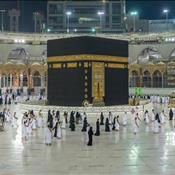 15-Apr-2022Umrah will Remain Open till 28th Shawwal 1443
15-Apr-2022Umrah will Remain Open till 28th Shawwal 1443 -
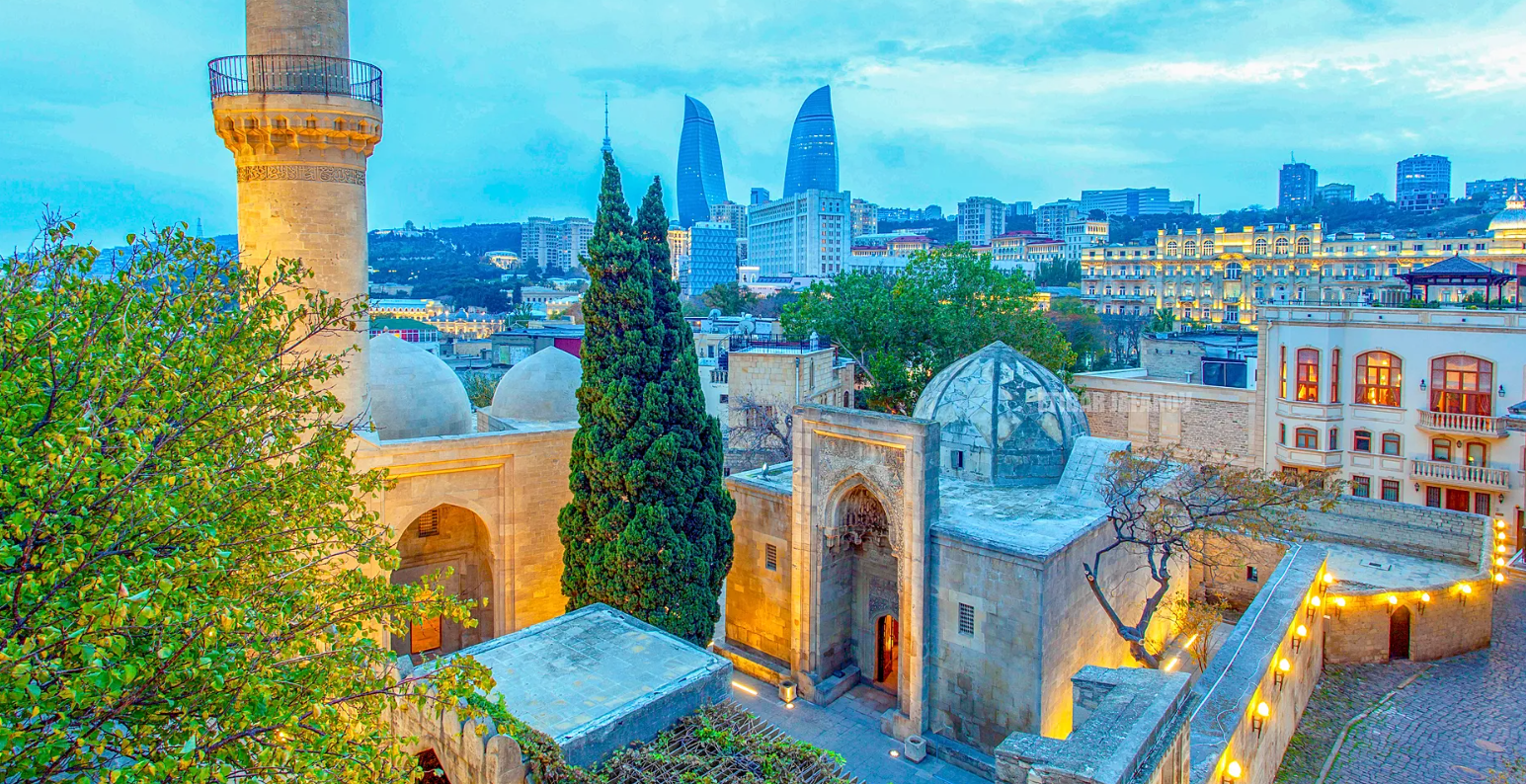 08-Oct-2025Discover the year-round wonders of Azerbaijan
08-Oct-2025Discover the year-round wonders of Azerbaijan -
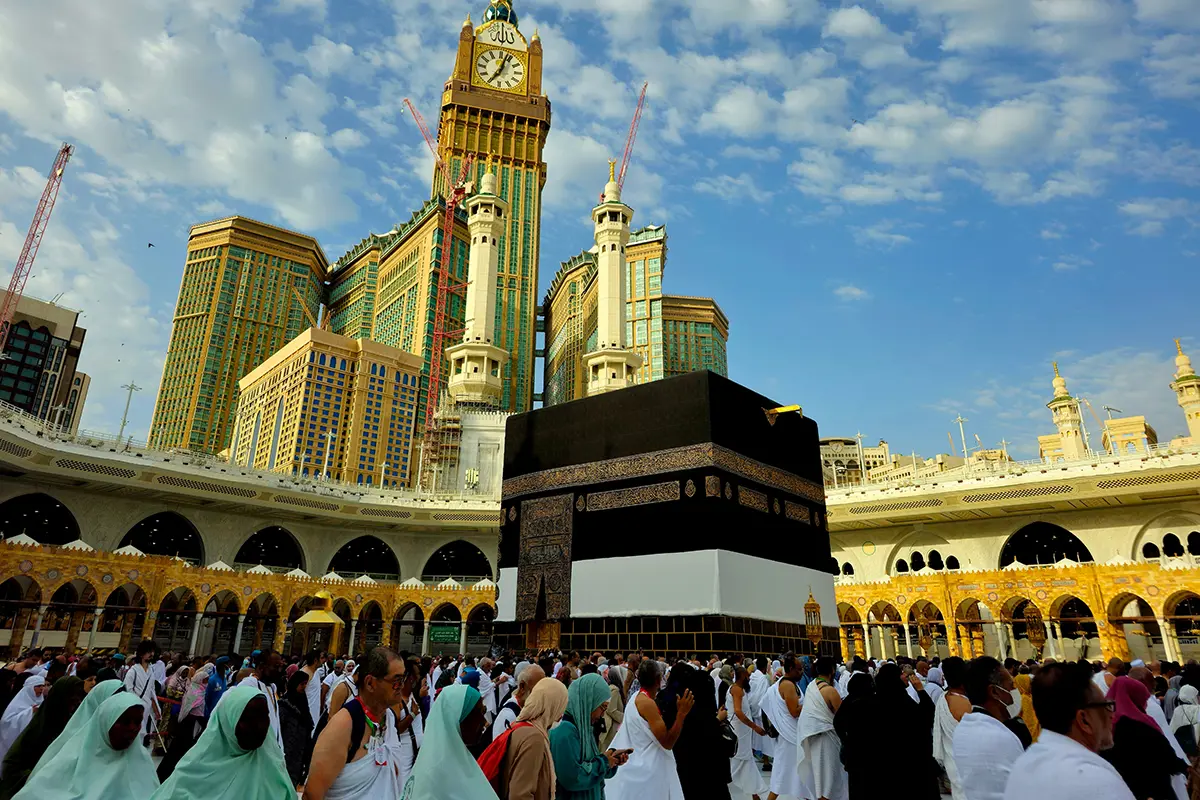 09-Jul-2025Over 250,000 Pakistanis Register for Hajj 2026 as Deadline Closes
09-Jul-2025Over 250,000 Pakistanis Register for Hajj 2026 as Deadline Closes -
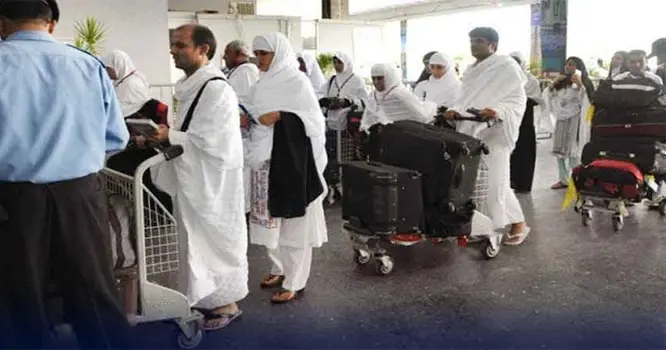 24-May-2025Over 60,000 Pakistanis Miss Out on Private Hajj: Delays, Policy Changes Leave Pilgrims Stranded
24-May-2025Over 60,000 Pakistanis Miss Out on Private Hajj: Delays, Policy Changes Leave Pilgrims Stranded -
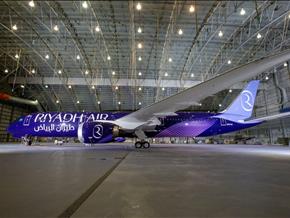 13-Sep-2024Riyadh Air Starts Test Flights - Will Launch Commercially From 2025
13-Sep-2024Riyadh Air Starts Test Flights - Will Launch Commercially From 2025 -
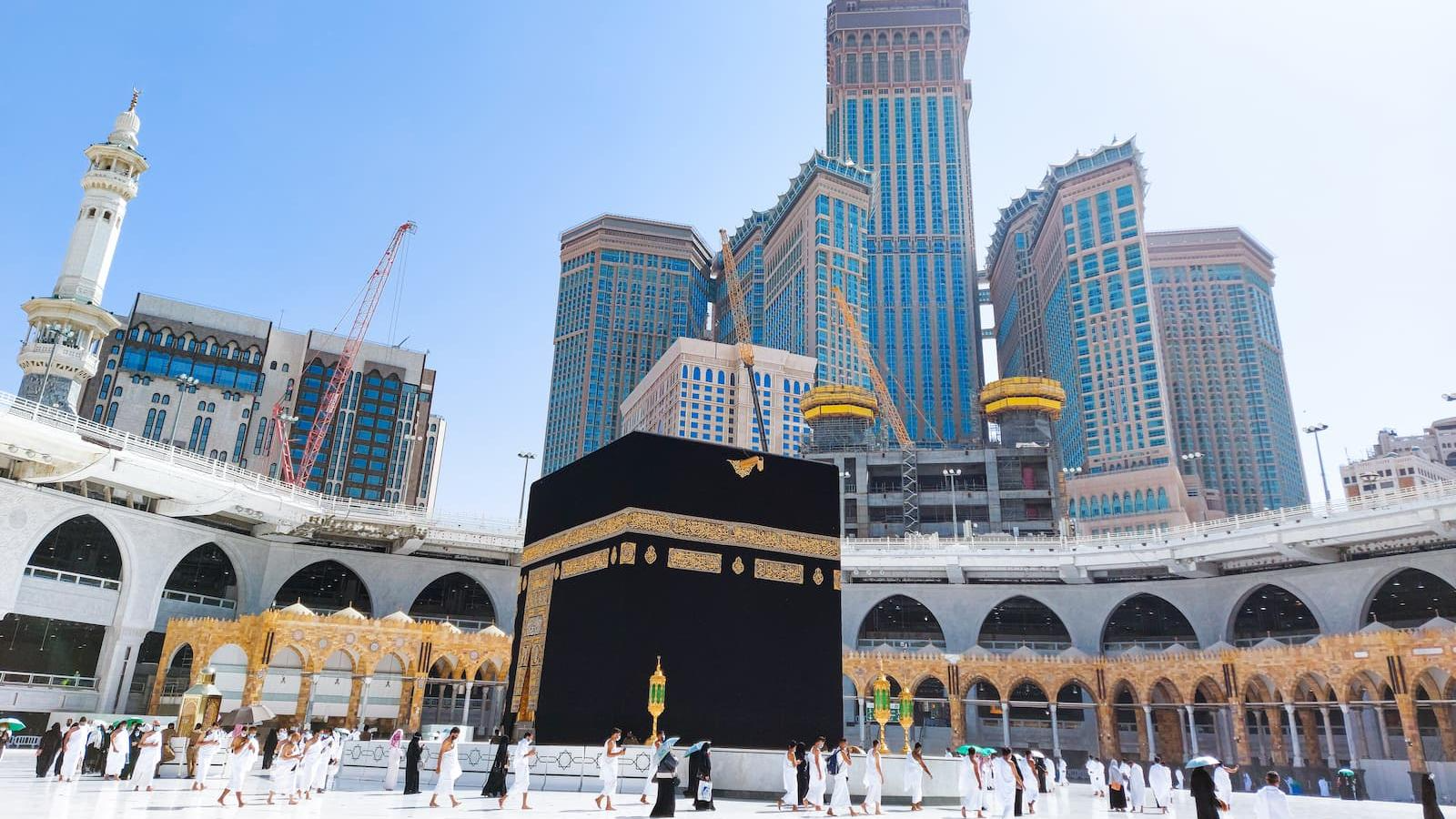 09-May-2025Important Advisory for Pakistan Hajj Pilgrims: Verify Approved Private Hajj Operators Before Booking
09-May-2025Important Advisory for Pakistan Hajj Pilgrims: Verify Approved Private Hajj Operators Before Booking -
 30-Aug-2025PIA Flights to UK Set to Resume in September
30-Aug-2025PIA Flights to UK Set to Resume in September -
 16-Sep-2025Honeymoon in Maldives vs Turkey: Which One is Right for Pakistani Couples?
16-Sep-2025Honeymoon in Maldives vs Turkey: Which One is Right for Pakistani Couples? -
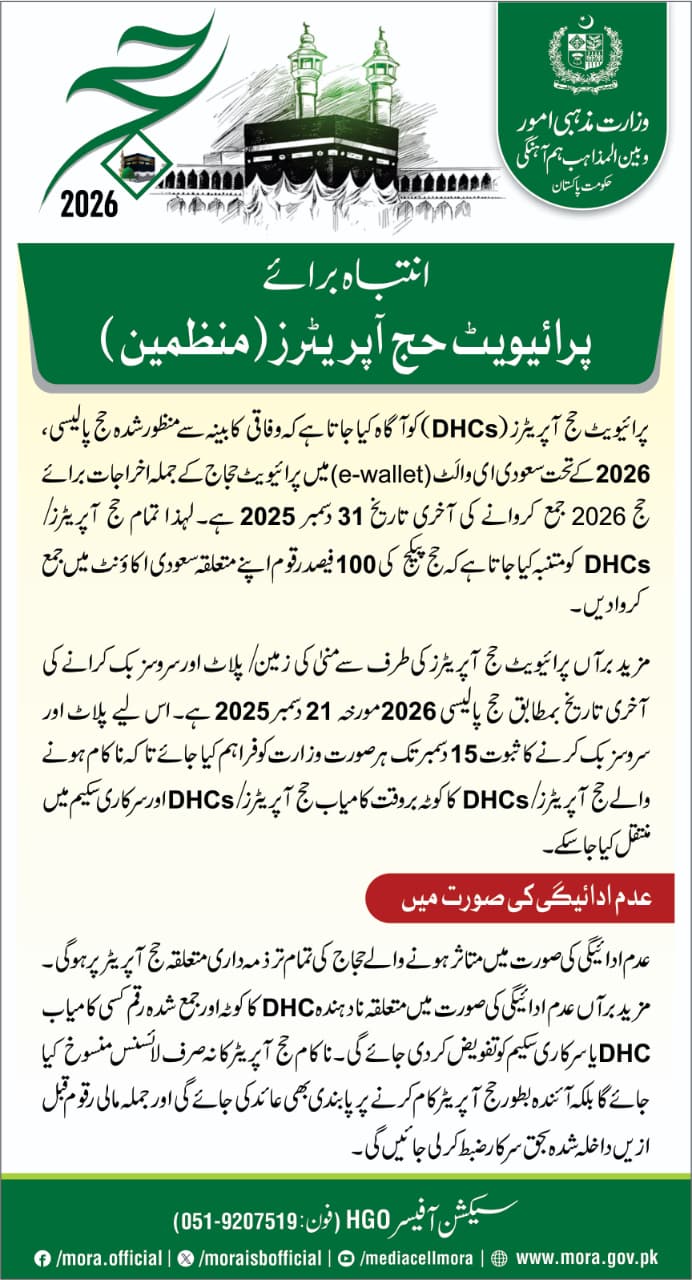 09-Dec-2025The Private Hajj Scheme 2026 Guide for Aspiring Pilgrims
09-Dec-2025The Private Hajj Scheme 2026 Guide for Aspiring Pilgrims -
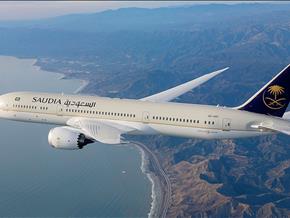 27-Jan-2025Best Airlines for Pilgrimage Travelers in 2025
27-Jan-2025Best Airlines for Pilgrimage Travelers in 2025 -
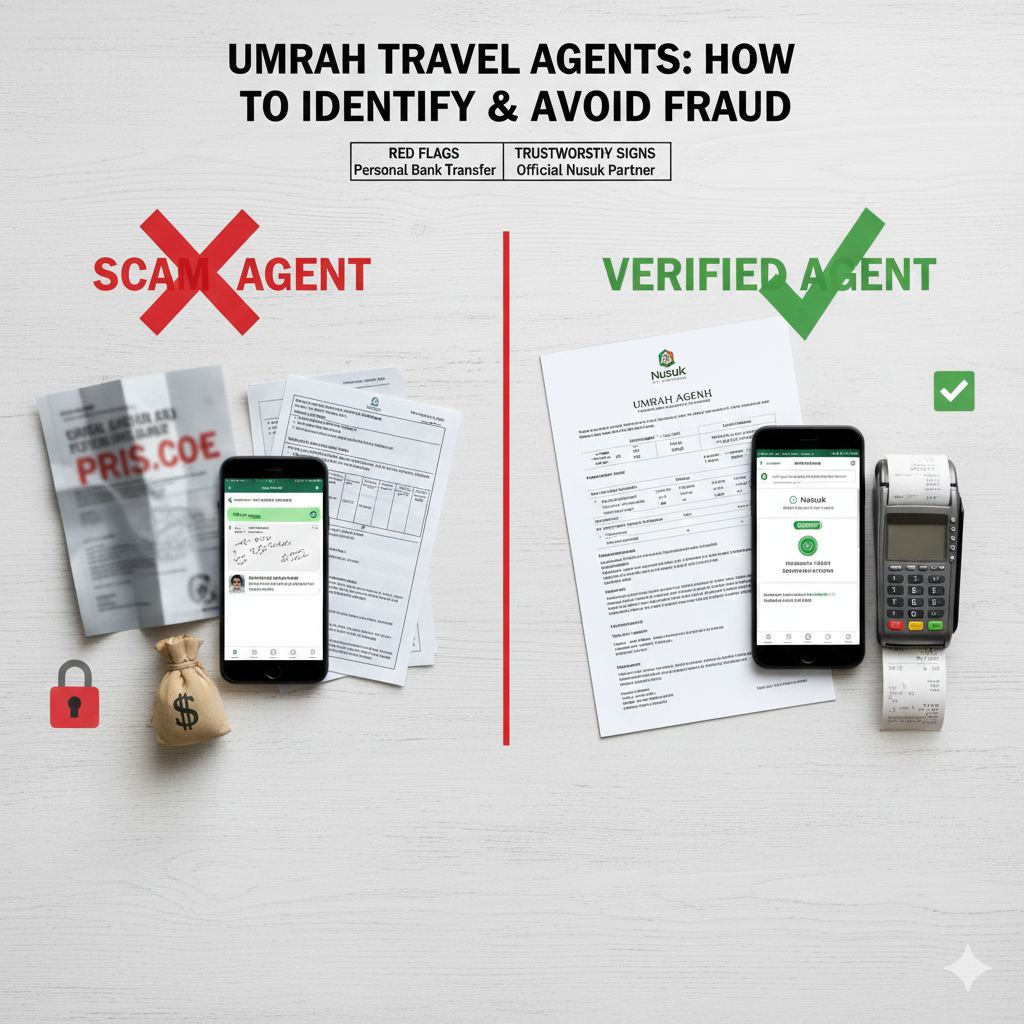 06-Jan-2026how to identify and avoid fake/fraud umrah travel agents
06-Jan-2026how to identify and avoid fake/fraud umrah travel agents
